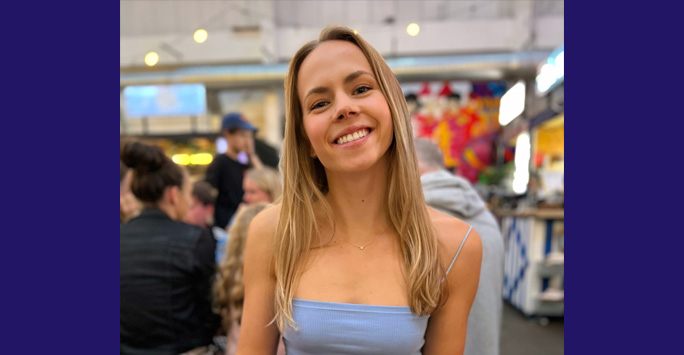
Fifth year Student Doctor Emily Kelly embarked on a mission to alleviate discomfort associated with chemotherapy, leading to the creation of innovative cooling gloves and boots for cancer patients.
Over the past year, Emily has been the driving force behind the project at Clatterbridge Cancer Centre. The cooling mittens and boots are aimed at patients undergoing certain types of chemotherapy in an attempt to reduce the associated complications. The inspiration for this project struck Emily during her fourth-year oncology placement when she discussed her own mother's treatment with a doctor.
Whilst observing Dr Rick Walshaw’s clinic last year (Oncology Consultant at Clatterbridge Cancer Centre), Emily mentioned that her mum was receiving chemotherapy at the time and was concerned about the potential side-effects, one of them being peripheral neuropathy.
Peripheral neuropathy, a common side effect of certain chemotherapy drugs, causes nerve damage to the fingers and toes and can be incredibly debilitating, with potential permanent pain. To mitigate this, Emily's mum’s research led her to discover that some patients in the US were using cold therapy during their chemotherapy infusions. This works to minimize blood flow to the extremities with the aim of lessening the amount of chemotherapy drug reaching those areas, therefore reducing the risk of neuropathy.
Emily realised this service wasn’t offered in the UK and there were no large-scale studies looking into its success. Driven by her desire to help cancer patients like her mother, Emily shared her idea with Dr Walshaw and recalls:
Little did I know I was speaking to a member of the hospital’s CREATE team, which is a peer support group for staff in the trust who have an idea for a project but don’t have any background in research and don’t know where to start.
"So, Dr Walshaw took my idea and ran with it, taking it to the CREATE group where they jumped through all the necessary hoops to begin the first part of the research – a feasibility study, which has just finished.”
It was brilliant to see the project get started, considering its humble beginnings.
As the project is being trialled, positive outcomes have been reported in participants taking part and the feedback is promising, which certainly brings hope to patients.
Reflecting on her experience and thinking to the future, Emily says:
Prior to this journey I didn’t think my career path would involve much research. However, having now seen how one of my ideas has snowballed into a potentially very impactful project, I can definitely see myself getting involved in research and plenty of quality improvement projects in the future.
For fellow students who may hesitate to voice their ideas during placements, Emily offers encouraging advice to seize every opportunity to make a difference:
There will be people who are keen to hear your opinions and ideas - such as the CREATE group at Clatterbridge Cancer Centre! There are also opportunities within the curriculum to start your own project, such as the Research and Scholarship modules, or your elective in fourth year.
Through her determination and collaborative spirit, Emily has developed a promising solution for peripheral neuropathy-related side effects, highlighting the positive impact student doctors can make during their training. Well done, Emily!